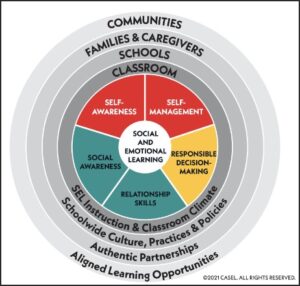
This © CASEL infographic on the Virginia Department of Education website shows how “effective implementation integrates SEL throughout the school’s academic curricula and culture, across the broader contexts of schoolwide practices and policies, and through ongoing collaboration with families and community organizations.”
by James A. Bacon
Beginning in the new school year, Alexandria City Public Schools will designate 30 minutes every day to “social-emotional learning,” according to the school system’s website. In addition, Student Support Teams will provide more “targeted and intensive” interventions for individual students identified through the school’s Multi Tiered System of Support process.
In Virginia the standard school year is 180 instructional days, or 990 instruction hours. The standard school day shall include 5 1/2 instructional hours in 1st through 12th grades, excluding time for recess, class changes and meals. In other words, 90 hours per year, equivalent to 10% of Alexandria schools’ instruction time, will be turned over to social-emotional learning.
What is social-emotional learning (SEL)? According to the Virginia Department of Education, the definition is:
The process through which all young people and adults acquire and apply the knowledge, skills, and attitudes to develop healthy identities, manage emotions and achieve personal and collective goals, feel and show empathy for others, establish and maintain supportive relationships, and make responsible and caring decisions.
One might interpret this as a bureaucratic, jargon-filled way of saying that SEL is teaching students how to behave themselves.
But that wouldn’t capture the full meaning. The term has a social-justice component. As VDOE also says: “The vision of social emotional learning in Virginia is to maximize the potential of all students and staff to become responsible, caring and reflective members of our diverse society by advancing equity, uplifting student voice, and infusing SEL into every part of the school experience.”
In the old days, children were expected to learn at home how to manage their emotions and behave themselves. Teachers reinforced positive behaviors and punished negative behaviors. But large swaths of the population have experienced social breakdown. In many neighborhoods the “code of the streets” rules. To combat what they called the “school-to-prison pipeline,” school systems in Virginia abandoned traditional disciplinary practices in favor of a therapeutic approach. It became the job of teachers, counselors and staff to teach students what they failed to learn at home: how to control their emotions, respect the rights of others, and solve disagreements without fights.
The SEL strategy encountered unprecedented stress in the 2020-21 academic year when students in many districts returned to school after a year of COVID-driven remote learning. Conditions were especially challenging in high-poverty schools where the code of the streets was most prevalent. Teachers have been quitting in droves, largely due to frustration and stress from their working conditions.
In Alexandria — and possibly many other “progressive” school systems — educators are doubling down on SEL in the new school year.
Clearly, the decision to dedicate 10% of school instructional time to something that parents, teachers, and the occasional trip to the principal’s office could satisfactorily handle, represents a tacit admission that previous efforts to implement SEL were not up to the post-COVID challenge.
Not every child suffers from a deficit in SEL skills such as self-awareness, self-management, personal responsibility, decision making, goal-directed behavior, social awareness, relationship skills, and optimistic thinking. But Alexandria exempts no one from the requirements. The letter from Superintendent Gregory C. Hutchings, Jr., to parents says the SEL sessions applies to each school. Teachers or counselors will use the DESSA, a suite of screening tools and assessments, to measure each student’s social-emotional skills.
If I were the parent of an Alexandria school kid, here’s the question I would ask: my child knows how to behave himself. He learns all those skills at home. Why is the school wasting resources on assessing my child’s social-emotional skills, and why is my child being subjected to a lumbering bureaucratic process that addresses the deficiencies of a relatively small percentage of the student body and/or applies only to certain schools?
Perhaps the process of social breakdown in American society now runs so deep that we have no choice but to turn over the task of socializing our children to school bureaucrats. But I’m not convinced that’s the case. No doubt we need special tools for dealing with recurrent disciplinary problems. But students who come to school ready to learn should not be penalized by having 10% of their instructional time devoted to teaching them emotional skills they already have.
(Hat tip to James Wyatt Whitehead.)